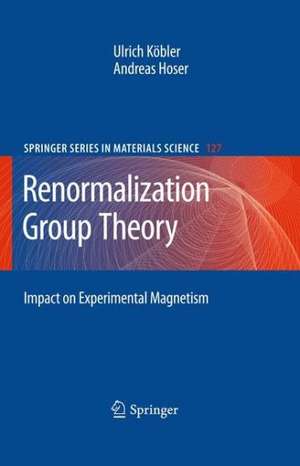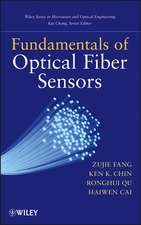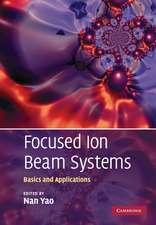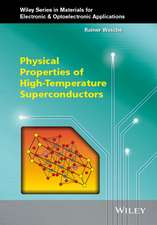Renormalization Group Theory: Impact on Experimental Magnetism: Springer Series in Materials Science, cartea 127
Autor Ulrich Köbler, Andreas Hoseren Limba Engleză Paperback – 14 mar 2012
Din seria Springer Series in Materials Science
- 18%
 Preț: 1820.22 lei
Preț: 1820.22 lei - 18%
 Preț: 776.09 lei
Preț: 776.09 lei - 24%
 Preț: 689.68 lei
Preț: 689.68 lei - 18%
 Preț: 968.96 lei
Preț: 968.96 lei - 20%
 Preț: 568.94 lei
Preț: 568.94 lei - 18%
 Preț: 953.65 lei
Preț: 953.65 lei - 18%
 Preț: 902.36 lei
Preț: 902.36 lei - 18%
 Preț: 953.65 lei
Preț: 953.65 lei - 20%
 Preț: 948.41 lei
Preț: 948.41 lei - 18%
 Preț: 1143.07 lei
Preț: 1143.07 lei - 18%
 Preț: 1111.53 lei
Preț: 1111.53 lei - 18%
 Preț: 1103.62 lei
Preț: 1103.62 lei - 18%
 Preț: 1225.94 lei
Preț: 1225.94 lei -
 Preț: 473.91 lei
Preț: 473.91 lei - 18%
 Preț: 782.42 lei
Preț: 782.42 lei -
 Preț: 433.47 lei
Preț: 433.47 lei - 18%
 Preț: 1116.40 lei
Preț: 1116.40 lei - 18%
 Preț: 946.24 lei
Preț: 946.24 lei - 18%
 Preț: 945.20 lei
Preț: 945.20 lei - 15%
 Preț: 641.20 lei
Preț: 641.20 lei - 18%
 Preț: 958.56 lei
Preț: 958.56 lei - 18%
 Preț: 1224.36 lei
Preț: 1224.36 lei - 15%
 Preț: 644.82 lei
Preț: 644.82 lei - 24%
 Preț: 833.43 lei
Preț: 833.43 lei - 24%
 Preț: 1060.33 lei
Preț: 1060.33 lei - 18%
 Preț: 964.10 lei
Preț: 964.10 lei - 18%
 Preț: 1224.36 lei
Preț: 1224.36 lei - 18%
 Preț: 1221.20 lei
Preț: 1221.20 lei - 18%
 Preț: 946.87 lei
Preț: 946.87 lei - 18%
 Preț: 1836.92 lei
Preț: 1836.92 lei - 15%
 Preț: 643.34 lei
Preț: 643.34 lei - 18%
 Preț: 1246.32 lei
Preț: 1246.32 lei - 18%
 Preț: 956.81 lei
Preț: 956.81 lei - 18%
 Preț: 953.52 lei
Preț: 953.52 lei - 15%
 Preț: 637.59 lei
Preț: 637.59 lei - 24%
 Preț: 1060.87 lei
Preț: 1060.87 lei
Preț: 1113.26 lei
Preț vechi: 1357.64 lei
-18% Nou
Puncte Express: 1670
Preț estimativ în valută:
213.02€ • 221.98$ • 176.38£
213.02€ • 221.98$ • 176.38£
Carte tipărită la comandă
Livrare economică 03-17 aprilie
Preluare comenzi: 021 569.72.76
Specificații
ISBN-13: 9783642261466
ISBN-10: 3642261469
Pagini: 408
Ilustrații: XIII, 394 p.
Dimensiuni: 155 x 235 x 25 mm
Greutate: 0.57 kg
Ediția:2010
Editura: Springer Berlin, Heidelberg
Colecția Springer
Seria Springer Series in Materials Science
Locul publicării:Berlin, Heidelberg, Germany
ISBN-10: 3642261469
Pagini: 408
Ilustrații: XIII, 394 p.
Dimensiuni: 155 x 235 x 25 mm
Greutate: 0.57 kg
Ediția:2010
Editura: Springer Berlin, Heidelberg
Colecția Springer
Seria Springer Series in Materials Science
Locul publicării:Berlin, Heidelberg, Germany
Public țintă
ResearchCuprins
History of Conventional Spin Wave Theory.- Basic Issues of Renormalization Group (RG) Theory.- Universality.- Microscopic Processes.- Non-Relevant Magnons.- Crossover Phenomena.- Metastability of Universality Classes.- Relevant and Non-Relevant Interactions.- Temperature Dependence of the Magnon Excitation Spectra.- Magnetic Heat Capacity.- Experimental Verification of GSW Bosons.- Magnets With and Without Magnon Gap (Goldstone Mode).- Microscopic Details: Spin Structure, Site Disorder, Two Order Parameters.- The Critical Magnetic Behaviour.- Thermal Lattice Expansion and Magnetostriction.- The Total Energy Content.- Superconductivity.- Conclusions.
Textul de pe ultima copertă
Spin wave theory of magnetism and BCS theory of superconductivity are typical theories of the time before renormalization group (RG) theory. The two theories consider atomistic interactions only and ignore the energy degrees of freedom of the continuous (infinite) solid. Since the pioneering work of Kenneth G. Wilson (Nobel Prize of physics in 1982) we know that the continuous solid is characterized by a particular symmetry: invariance with respect to transformations of the length scale. Associated with this symmetry are particular field particles with characteristic excitation spectra. In diamagnetic solids these are the well known Debye bosons. This book reviews experimental work on solid state physics of the last five decades and shows in a phenomenological way that the dynamics of ordered magnets and conventional superconductors is controlled by the field particles of the infinite solid and not by magnons and Cooper pairs, respectively. In the case of ordered magnets the relevant field particles are called GSW bosons after Goldstone, Salam and Weinberg and in the case of superconductors the relevant field particles are called SC bosons. One can imagine these bosons as magnetic density waves or charge density waves, respectively. Crossover from atomistic exchange interactions to the excitations of the infinite solid occurs because the GSW bosons have generally lower excitation energies than the atomistic magnons. According to the principle of relevance the dynamics is governed by the excitations with the lowest energy. The non relevant atomistic interactions with higher energy are practically unimportant for the dynamics.
Caracteristici
Summarizes the current state-of-the-art of renormalization theory Strong applications to magnetism Reference for researchers Graduate text for students for the didactic explanations of the principles and applications






